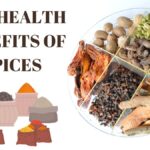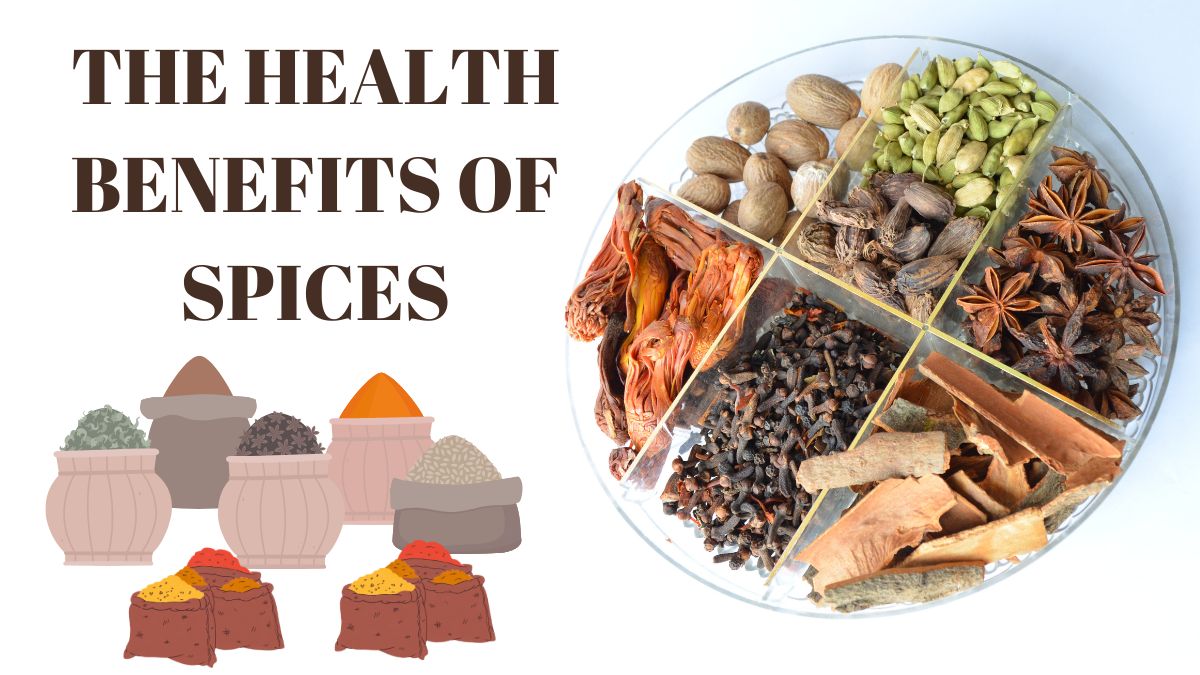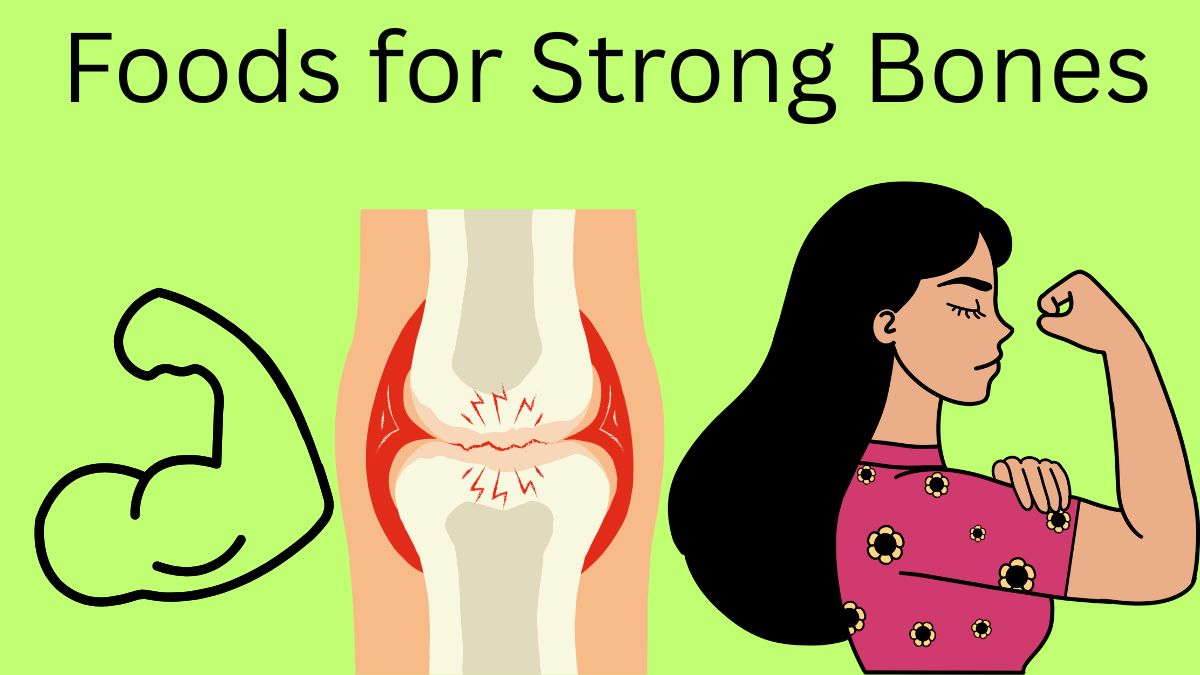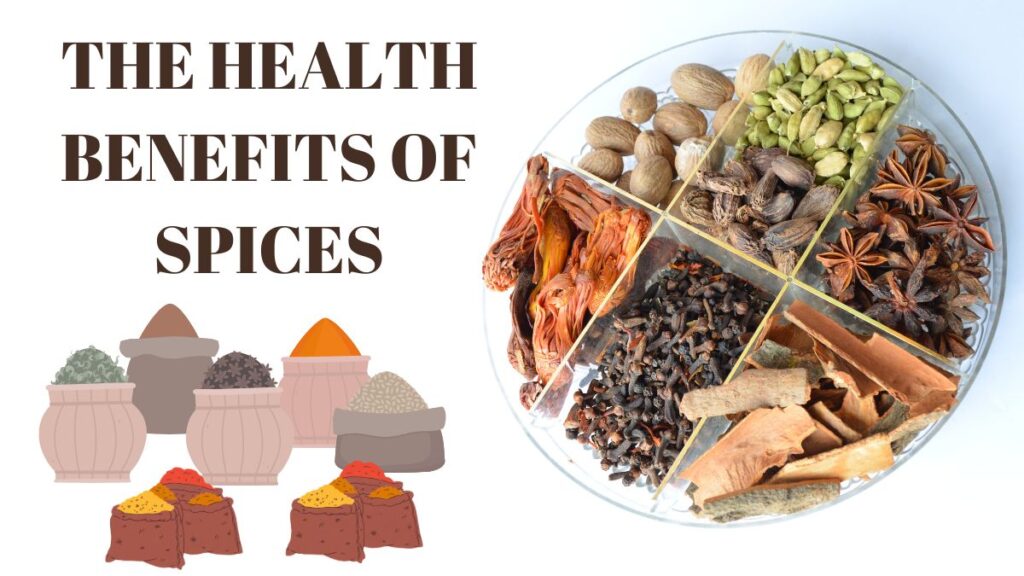
Table of Contents
Introduction Of The Health Benefits Of Spices-When we think of staying healthy, we often focus on big changes like hitting the gym or following a strict diet plan. But sometimes, the simplest things can bring the biggest impact. One such hidden gem? Spices—yes, those colorful, aromatic ingredients sitting in your kitchen cabinet can do a lot more than just flavor your food. They are nature’s mini-medicines packed with healing powers. Spices have been used for thousands of years—not only to enhance taste but also to treat ailments, improve digestion, fight inflammation, and even protect against chronic diseases. In this article, we’ll explore how these everyday ingredients are much more powerful than they seem
What Are Spices and its Health benefits, Really?
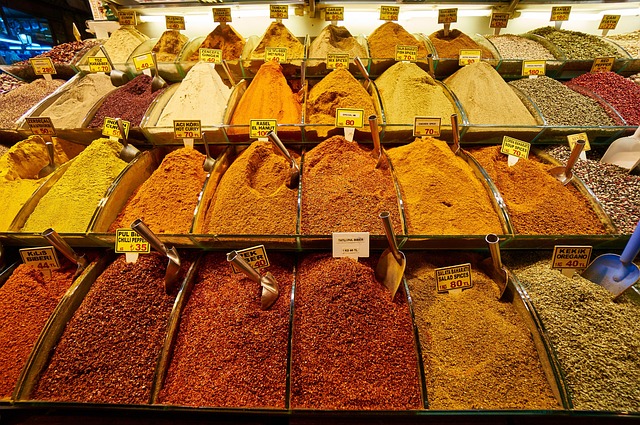
Spices are parts of plants—like seeds, bark, roots, and fruits—that are dried and used for flavoring, coloring, or preserving food. They’re not the same as herbs (which usually come from leaves), but they often work hand-in-hand in cooking.
Examples of common spices include turmeric, cinnamon, ginger, black pepper, cumin, cardamom, cloves, chili, and more.
Types of Spices-There are hundreds of spices used around the world, each with its own unique flavor, aroma, and health benefits. While it’s difficult to list every single spice, they can be grouped into major types based on their plant part and usage.
Here are commonly used spices across various cuisines:
1. Seed-Based Spices
- Cumin
- Coriander seeds
- Fennel seeds
- Mustard seeds
- Fenugreek seeds
- Caraway
- Nigella seeds (Kalonji)
- Anise seeds
- Celery seeds
2. Bark-Based Spices
- Cinnamon
- Cassia
- Bay leaf
3. Root and Rhizome Spices
- Ginger
- Turmeric
- Galangal
- Horseradish
- Wasabi
4. Fruit and Pod Spices
- Black pepper
- White pepper
- Long pepper
- Allspice
- Cardamom (Green and Black)
- Vanilla pods
- Chilies (Dried Red Chili, Chili Powder)
- Paprika
5. Flower-Based Spices
- Cloves
- Saffron
- Mace (outer covering of nutmeg)
- Hibiscus (used in teas and spice blends)
6. Leaf-Based Spices (Used as spices, not herbs)
- Curry leaves (often dried and used like a spice)
- Dried fenugreek leaves (Kasuri methi)
- Kaffir lime leaves (in Southeast Asian cuisine)
7. Resin and Gum Spices
- Asafoetida (Hing)
- Myrrh
8. Other Unique Spices
- Nutmeg (seed of a fruit)
- Star anise
- Sumac
- Tamarind (used as a souring spice)
- Amchur (dried mango powder)
- Ajwain (carom seeds)
Let’s explore some of the most powerful spices and how they can benefit your health.
1. Turmeric – The Golden Healer
Turmeric, the bright yellow spice commonly used in curries, is one of the most powerful healing spices in the world. Its active compound, curcumin, has strong anti-inflammatory and antioxidant properties.
Tip: For better absorption, always pair turmeric with black pepper. Pipeline in black pepper boosts cur cumin absorption by up to 2000%.
2. Ginger – The Soothing Root
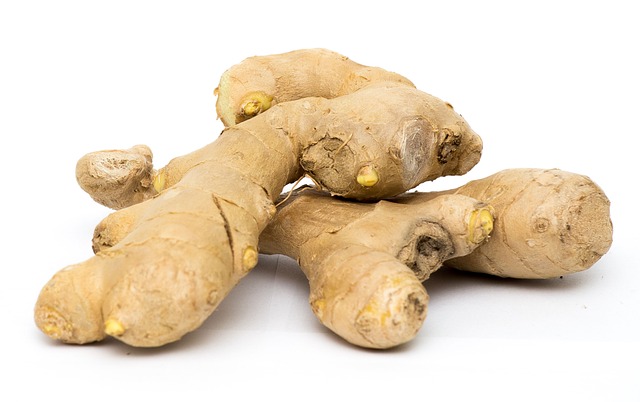
Ginger is a warming spice with a strong, spicy flavor and powerful healing properties. It’s been used in Ayurvedic and Chinese medicine for centuries.
Health Benefits of Ginger:
- Eases nausea and vomiting: Very effective during pregnancy or while traveling.
- Reduces muscle pain: Helpful for post-workout soreness.
- Lowers blood sugar: May improve insulin resistance.
- Improves digestion: Stimulates saliva and bile production for better gut health.
Tip: Add fresh ginger to teas, soups, or simply chew a small piece for stomach discomfort.
3. Cinnamon – Sweet and Strong
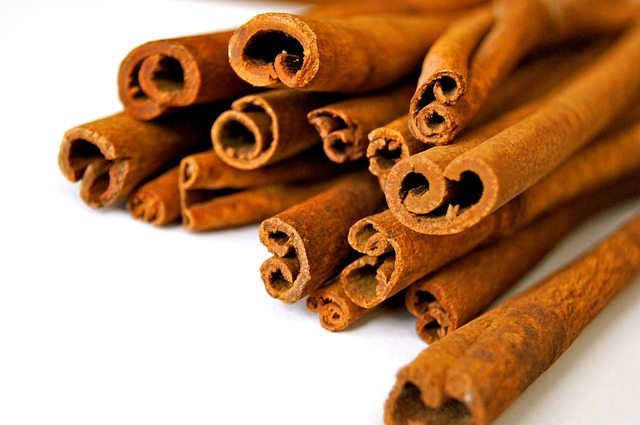
Cinnamon isn’t just a delicious addition to your desserts. It’s also one of the healthiest spices with powerful medicinal effects.
Health Benefits of Cinnamon:
- Lowers blood sugar: Especially beneficial for people with Type 2 diabetes.
- Protects heart health: Reduces cholesterol and triglycerides.
- Fights infections: Has antibacterial and antifungal properties.
- Rich in antioxidants: Helps protect the body from oxidative damage.
Use Ceylon cinnamon (true cinnamon) over the more common cassia variety for maximum health benefits.
4. Black Pepper – The King of Spices
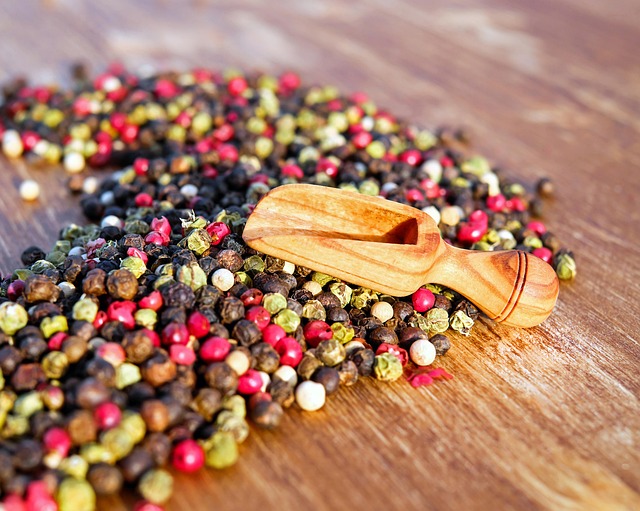
Known as the “king of spices,” black pepper is more than a seasoning—it’s a powerful antioxidant and digestive booster.
Health Benefits of Black Pepper:
- Boosts nutrient absorption: Helps your body absorb nutrients like curcumin (from turmeric), selenium, and beta-carotene.
- Improves digestion: Stimulates the release of digestive enzymes.
- Fights free radicals: High in antioxidants that help prevent cell damage.
Tip- Sprinkle freshly ground black pepper over meals, soups, and salads to enjoy its full benefits.
5. Cumin – The Metabolism Booster
Cumin has a warm, earthy flavor and is popular in Indian, Middle Eastern, and Latin American cuisines.
Health Benefits of Cumin:
- Aids digestion: Helps with bloating, gas, and indigestion.
- Boosts immunity: Rich in iron and supports the immune system.
- Regulates blood sugar: May help with blood glucose control.
- Improves fat metabolism: Some studies show it may help with weight loss.
Tip- Roast cumin seeds and use them as a powder in your meals for enhanced taste and health.
6. Cardamom – The Detox Queen
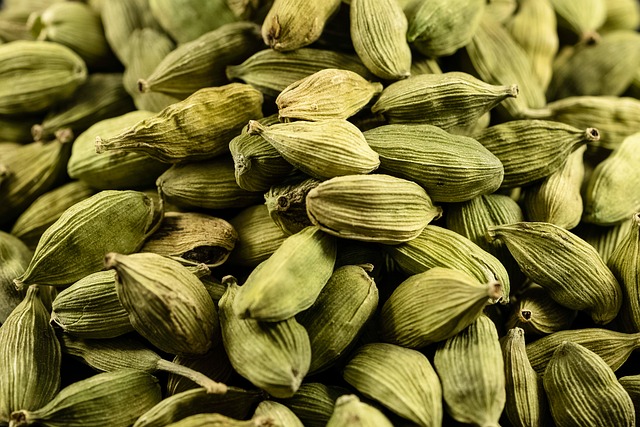
This sweet and aromatic spice is a natural detoxifier with a soothing fragrance.
Health Benefits of Cardamom:
- Improves digestion: Helps with acid reflux and stomach cramps.
- Freshens breath: Naturally antibacterial and great for oral health.
- Detoxifies the body: Acts as a diuretic and helps eliminate waste.
- Boosts mood: Its scent can reduce stress and anxiety.
Tip- Add cardamom to tea or desserts, or chew the pods for a fresh mouth.
7. Cloves – Small but Mighty
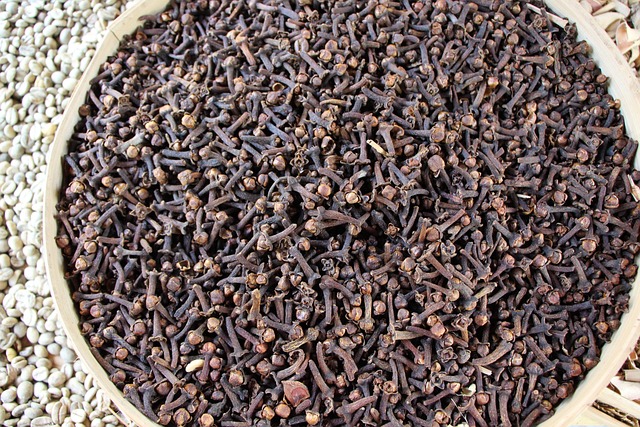
Cloves are tiny dried flower buds with a bold flavor and impressive medicinal qualities.
Health Benefits of Cloves:
- Relieves toothache: Clove oil has natural pain-relieving effects.
- Supports liver health: Helps in detoxification.
- Anti-inflammatory: Rich in eugenol, which reduces inflammation.
- Improves bone health: Contains manganese, a mineral essential for bones.
Tip –Use whole cloves in cooking or clove powder in teas for relief from cough and colds.
8. Chili – The Fat Burner
Chili peppers contain capsaicin, a compound that brings the heat and the health.
Health Benefits of Chili:
- Boosts metabolism: May help burn more calories.
- Reduces appetite: Aids in weight management.
- Improves circulation: Enhances blood flow and heart health.
- Pain relief: Used in topical creams to relieve muscle pain.
9. Fenugreek – The Hormone Helper
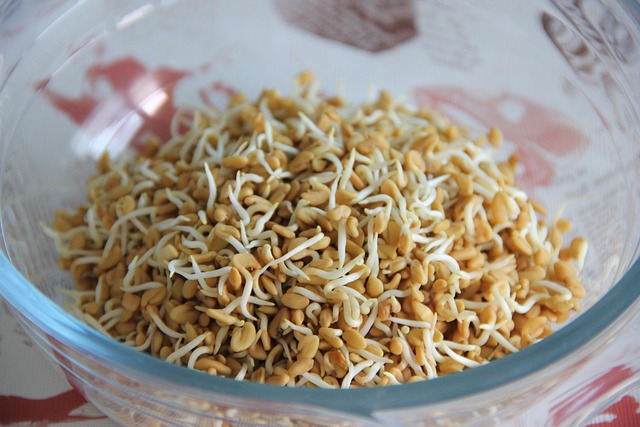
Fenugreek seeds are often used in Indian cooking and traditional medicine.
Health Benefits of Fenugreek:
- Helps control diabetes: Lowers blood sugar and improves insulin sensitivity.
- Supports lactation: Commonly used to boost breast milk supply in new mothers.
- Improves digestion: Soothes heartburn and indigestion.
- Balances hormones: May help reduce menstrual discomfort.
Tip-Soak seeds overnight and drink the water in the morning for maximum benefit.
Importance of Spices as Health Purpose
Spices are not just flavor enhancers—they are natural healers with powerful health benefits. For centuries, they have been used in traditional medicine systems like Ayurveda, Traditional Chinese Medicine (TCM), and Unani to prevent and treat various health issues.
Here are the main health-related importance of spices:
1. Anti-Inflammatory Properties
Many spices help reduce inflammation in the body, which is the root cause of many chronic diseases like arthritis, heart disease, diabetes, and cancer.
Examples:
- urmeric (curcumin reduces inflammation)
- Ginger (blocks inflammatory pathways)
- Cinnamon (anti-inflammatory antioxidants)
2. Boosts Immunity
Spices are packed with antioxidants and immune-supporting compounds that help the body fight infections and stay strong.
Examples:
- Black pepper (fights infections, enhances absorption of nutrients)
- Cloves and cinnamon (antibacterial, antiviral)
- Garlic (immune booster and antibacterial)
3. Supports Digestion
Many spices stimulate digestive enzymes and bile flow, which helps break down food and prevents gas, bloating, and indigestion.
Examples:
- Cumin, fennel, and carom seeds (ajwain) aid in digestion
- Ginger reduces nausea and improves gut motility
- Coriander seeds cool the stomach and help relieve acidity
Some spices help lower bad cholesterol, improve blood circulation, and regulate blood pressure.
Examples:
- Garlic lowers cholesterol and blood pressure
- Cinnamon improves heart function and reduces bad cholesterol
- Turmeric improves endothelial (blood vessel) function
5. Controls Blood Sugar Levels
Certain spices are beneficial for people with diabetes or prediabetes by improving insulin sensitivity and reducing blood sugar spikes.
Examples:
- Cinnamon (helps lower fasting blood glucose)
- Fenugreek (improves insulin function)
- Cloves (regulate blood sugar metabolism)
6. Helps in Weight Management
Some spices help burn fat, increase metabolism, or reduce appetite naturally.
Examples:
- Chili peppers (capsaicin boosts metabolism)
- Black pepper (increases fat-burning ability)
- Ginger (reduces hunger and improves digestion)
7. Enhances Brain Function and Mood
Spices can boost memory, reduce anxiety, and protect brain cells from damage.
Examples:
- Turmeric (curcumin increases brain-derived neurotrophic factor, BDNF)
- Saffron (acts as a natural antidepressant)
- Nutmeg (used in small quantities to calm the nerves)
Spices help cleanse the liver, improve kidney function, and promote elimination of toxins.
8. Acts as Natural Detoxifiers
Spices help cleanse the liver, improve kidney function, and promote elimination of toxins.
Examples:
- Cardamom (cleanses the urinary system)
- Turmeric (supports liver detoxification)
- Fenugreek (flushes out toxins through digestion)
9. Good for Oral and Dental Health
Some spices kill bacteria in the mouth, freshen breath, and help prevent cavities or infections.
Examples:
- Cloves (used for toothache relief and fresh breath)
- Cardamom (natural mouth freshener)
- Cinnamon (antibacterial)
10. Natural Pain Relief
Spices have pain-relieving compounds that work on muscles, joints, and headaches.
Examples:
- Ginger (relieves joint pain and menstrual cramps)
- Capsaicin from chili (used in pain relief creams)
- Clove oil (toothache relief)
11. Balances Hormones Naturally
Spices help regulate hormonal imbalances in both men and women.
Examples:
- Fenugreek (supports lactation and hormone regulation)
- Fennel (helps with menstrual cramps and bloating)
- Cinnamon (improves insulin and reproductive health in PCOS)
Summary of Importance of Spices for Health:
| Benefit | Key Spices |
|---|---|
| Anti-inflammatory | Turmeric, Ginger, Cinnamon |
| Immune Boosting | Garlic, Clove, Black Pepper |
| Digestive Aid | Cumin, Ajwain, Fennel |
| Heart Health | Garlic, Turmeric, Cinnamon |
| Blood Sugar Control | Fenugreek, Clove, Cinnamon |
| Weight Loss | Chili, Black Pepper, Ginger |
| Brain & Mood Support | Turmeric, Saffron, Nutmeg |
| Detoxification | Cardamom, Turmeric, Fenugreek |
| Oral Health | Clove, Cardamom, Cinnamon |
| Pain Relief | Ginger, Clove, Chili (Capsaicin) |
| Hormonal Balance | Fenugreek, Fennel, Cinnamon |
Uses of Spices in Daily Life
Spices are not just for adding flavor—they serve many purposes in our everyday routines. Here are the main uses of spices in daily life:
1. Enhancing Food Flavor
- Spices bring aroma, color, and taste to dishes.
- Each spice has a unique flavor—spicy, sweet, bitter, earthy, or pungent.
- Common in curries, soups, stews, rice, meats, and baked goods.
2. Promoting Health and Wellness
- Boost immunity and digestion naturally.
- Help control blood sugar, reduce inflammation, and support heart health.
- Used in home remedies for cold, cough, indigestion, and pain.
3. Used in Traditional Medicine
- Spices like turmeric, ginger, and cinnamon are part of Ayurveda and Unani medicine.
- Clove oil is used for toothaches; ginger tea for nausea.
4. Making Herbal Teas and Drinks
- Spices like cardamom, cinnamon, ginger, and fennel are used in teas.
- Masala chai is a daily staple in many cultures.
5. Used in Beauty and Skincare
- Turmeric is used in face masks for glowing skin.
- Clove and cinnamon are used in DIY acne or anti-aging remedies.
6. Natural Cleaning and Freshening
- Cloves and cinnamon sticks can freshen air naturally.
- Lemon and spice combinations used in natural cleaners.
7. Spiritual and Cultural Uses
- Spices are used in religious rituals, especially incense (e.g., clove, saffron).
- Used in traditional ceremonies, weddings, and festivals.
8. Food Preservation
- Certain spices like mustard seeds, turmeric, and black pepper help preserve food.
- Used in pickling and spice rubs.
9. Fragrance and Aromatherapy
- Spices like cardamom, clove, and cinnamon are used in perfumes and essential oils.
- Aromatic oils made from spices calm the mind and relieve stress.
Are Spices Harmful for Health?
Spices are not harmful when used in moderation—in fact, they are full of health benefits. However, excessive use or improper handling of certain spices can cause side effects or health issues.
When Spices Are Good for Health:
Spices like turmeric, ginger, cinnamon, black pepper, cumin, and cardamom:
- Support digestion
- Boost immunity
- Reduce inflammation
- Help with blood sugar and cholesterol
- Add antioxidants to the diet
- Are used as natural remedies for minor health problems
When Spices Can Be Harmful
1. Overuse of Spices
- Too much chili or pepper can irritate the stomach lining and cause ulcers or heartburn.
- Excessive turmeric might thin the blood or cause digestive issues in some.
- Large amounts of nutmeg can be toxic and affect the nervous system.
2. Spice Sensitivities or Allergies
- Some people may be allergic to spices like mustard, garlic, or cinnamon.
- Can cause skin irritation, rashes, or breathing problems.
3. Spices During Certain Health Conditions
- People with acid reflux (GERD) may react badly to spicy foods.
- Spices may interact with medications (e.g., turmeric with blood thinners).
- In pregnancy, strong laxative spices like fenugreek or asafoetida should be used with caution.
4. Low-Quality or Contaminated Spices
- Adulterated spices may contain harmful colorants, chemicals, or fillers.
- Always buy from trusted brands or organic sources.
- Use moderate amounts—a pinch or teaspoon is often enough.
- Use a variety of spices, not just one repeatedly.
- Avoid over-frying spices to keep their nutrients and avoid bitterness.
- Store in cool, dry places in airtight jars to prevent mold or loss of potency.
How to Identify the spices quality
Identifying the quality of spices is important for ensuring their flavor, aroma, purity, and health benefits. Whether you’re buying whole spices or ground powders, using high-quality spices enhances your food and avoids harmful adulterants.
1. Check the Aroma (Smell Test)
- Good quality spices should have a strong, natural aroma.
- If the spice smells dull, faded, or strange, it may be old or adulterated.
- For example:
- Cinnamon should smell sweet and woody.
- Cumin should have a warm, nutty aroma.
- Turmeric should smell earthy, not chemical-like.
2. Look at Color and Appearance
- Natural spices have vibrant but not overly bright colors.
- Extremely bright or uneven colors may indicate artificial coloring.
- Check for:
- Turmeric: Golden yellow—not neon bright.
- Chili Powder: Deep red—not shiny or orange.
- Cardamom pods: Plump and green—not faded or split.
3. Texture and Feel
- Whole spices should feel firm, not soft or crumbling.
- Ground spices should be fine and dry, not clumpy or sticky.
- If spices are sticky, they might be old or contain added oil or moisture.
4. Do Simple Adulteration Tests (At Home)
Here are quick home tests to check for purity:
Turmeric Powder Test:
- Mix in water. Pure turmeric settles down, while adulterants float.
- If color spreads immediately, it may contain synthetic dye.
Chili Powder Test:
- Sprinkle in water. If color spreads quickly, it may be adulterated with coal tar dye.
Black Pepper Test:
- Drop in water. Pure black pepper sinks, while dried papaya seeds float.
Hing (Asafetida) Test:
- Rub a little between fingers. It should smell sharp and dissolve quickly. Fake hing feels like clay.
5. Check the Packaging and Brand
- Buy from reputed brands or certified organic sources.
- Look for:
- FSSAI/ISO/AGMARK certification (in India)
- “Organic Certified” labels
- Manufacturing and expiry dates
- Avoid spices sold in open containers or without labels.
6. Buy Whole Spices Instead of Ground (If Possible)
- Whole spices are harder to adulterate and stay fresh longer.
- You can grind them fresh at home using a spice grinder or mortar and pestle.
7. Storage and Shelf Life Matter
- Even good spices lose quality if stored poorly.
- Keep spices:
- In airtight jars
- Away from heat, light, and moisture
- Replace ground spices every 6–12 months and whole spices every 1–2 years.
Signs of High-Quality Spices:
| Feature | Good Quality | Poor Quality |
|---|---|---|
| Aroma | Strong, fresh | Weak, musty |
| Color | Natural tone | Too bright or faded |
| Texture | Clean, dry | Sticky, clumpy |
| Packaging | Sealed, labeled | Open, loose, unlabeled |
| Shelf Life | Clearly marked | Expired or missing date |
Conclusion: The Healing Power of Spices
Spices are far more than just ingredients to flavor our meals—they are powerful natural healers gifted to us by nature. From boosting immunity and improving digestion to reducing inflammation and protecting against chronic diseases, spices offer a wide range of health benefits. For centuries, they have been used in traditional medicine systems not only to treat illness but also to promote daily wellness.
Incorporating spices like turmeric, ginger, cinnamon, black pepper, and cardamom into your everyday meals is a simple, affordable, and effective way to support your body naturally. When used wisely and in moderation, these tiny wonders can contribute to a healthier, more vibrant life.
In a world where many seek quick fixes and artificial solutions, the healing power of spices reminds us that true health often begins in the kitchen—one pinch at a time.

